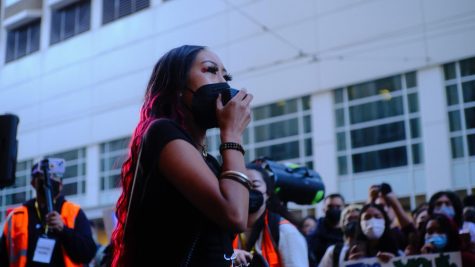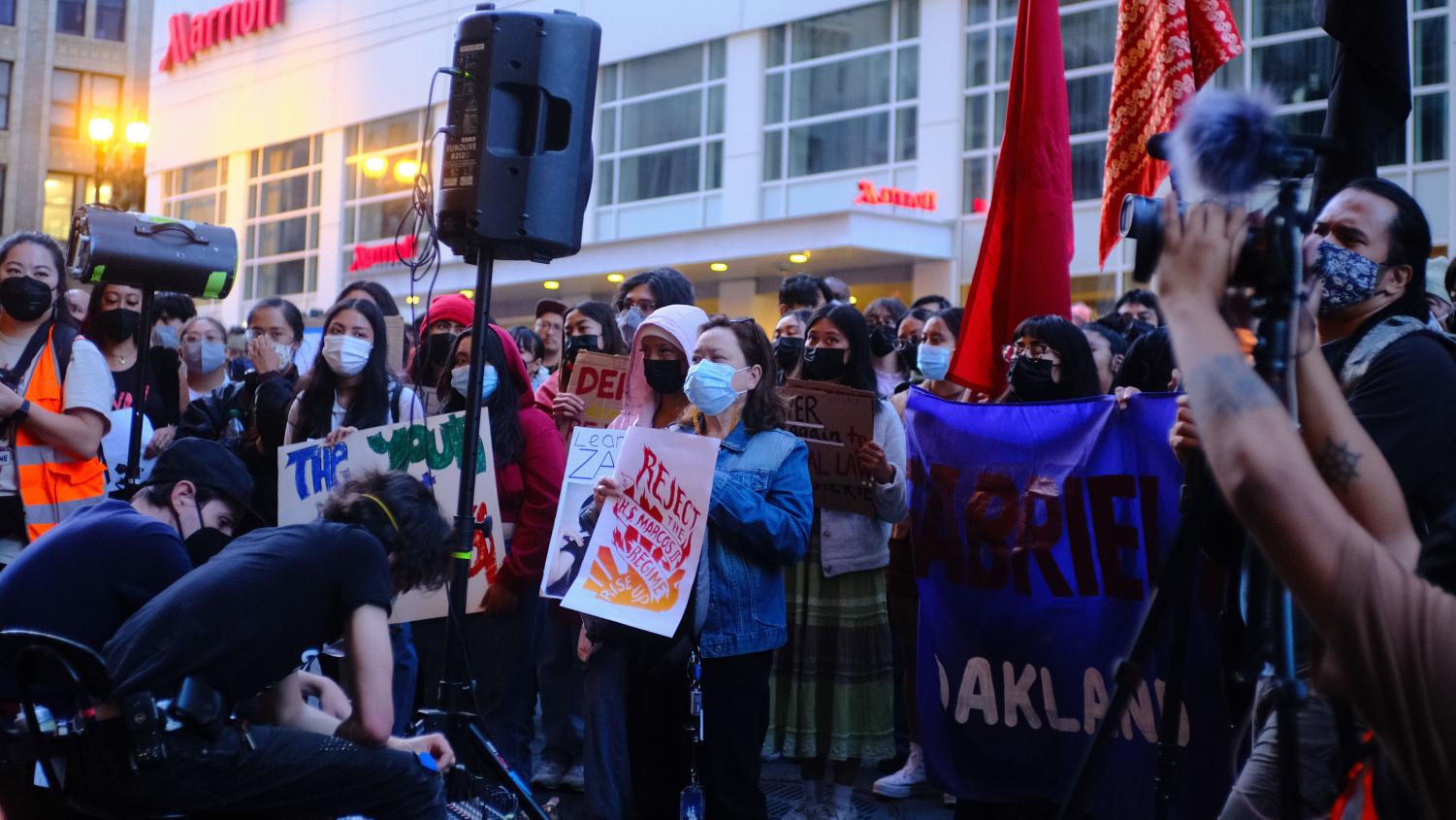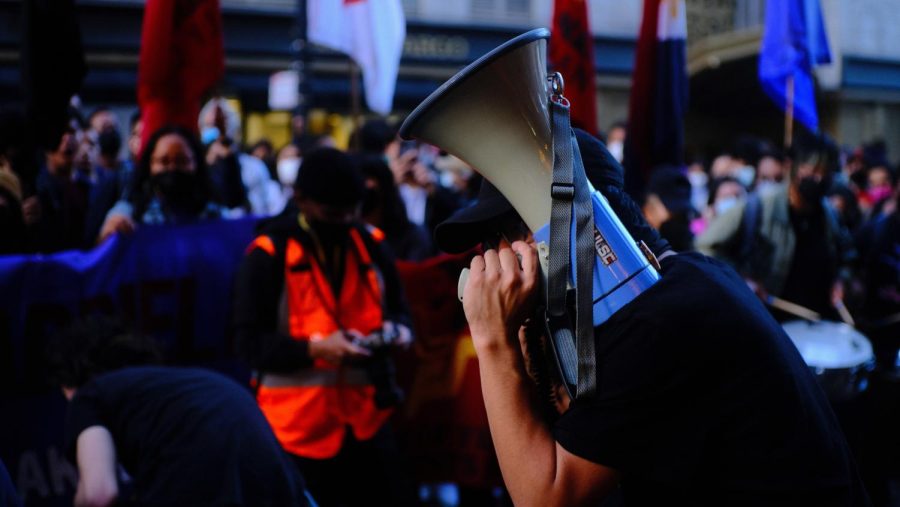
‘Never forget! Never again!’ Filipino Americans protest 50 years after Philippine martial law proclamation
Protestors gathered to denounce Philippine President Marcos Jr. and his late father’s martial law legacy on the day he addressed the United Nations General Assembly in New York.
September 21, 2022
“MAKIBAKA! HUWAG MATAKOT!”
The cry filled the air and drowned out the usual cacophony of San Francisco’s busy roads as approximately 300 people filled the sidewalk and poured onto Sutter Street.
The chant originated under former Philippine President Ferdinand Marcos Sr.’s dictatorship. It translates to “Dare to struggle! Don’t be afraid!” in English and has become a battle cry for Filipinos protesting against the Philippine government.
Protestors gathered in front of the Philippine Consulate General of San Francisco to speak out against recently-elected Ferdinand “Bongbong” Marcos Jr.’s presidency and commemorate the 50th anniversary of his father’s declaration of martial law in the Philippines.
On Sept. 21, 1972, Marcos Sr. signed Proclamation 1081, which placed the Philippines under martial law, transferred law enforcement authority to the Armed Forces of the Philippines and suspended the writ of habeas corpus. This meant that anybody could be arrested and detained without reason.
Tuesday’s protest was sponsored by the San Francisco chapter of Bayan USA, the International Coalition for Human Rights in The Philippines and Malaya Movement.
Many other Filipino organizations were in attendance, such as SF State’s and UC Berkeley’s chapters of the League of Filipino Students and varying local chapters of Anakbayan.
“There hasn’t been any change from the last administration to now,” said activist and SF State alumnus Brandon Lee.
Lee survived an assassination attempt in 2019 for his work to defend indigenous people and their land in the Philippines.
He was only one of many who spoke out against the corruption of the Philippine government, but that criticism often comes with dangerous repercussions.
Red-tagging—also known as terror-tagging—is the practice of labeling and accusing individuals, groups or organizations as subversive and connected to terror networks. The strategy is often conducted by state agents, such as law enforcement or military officials.
Many individuals who are red-tagged end up arrested on false charges, often with little to no recourse.
This was the case when Marcos Sr. declared martial law in the Philippines.
According to an Instagram post from CNN Philippines, 70,000 people were arrested, 34,000 were tortured, 11,103 became victims of human rights violations and 2,326 were killed or “disappeared.”
One of the speakers at the protest was Benjamin Pineda, a martial law survivor who currently works for ACLU Northern California.
“In some ways, you are prepared for the eventualities because prior to our arrest, a lot of our friends have suffered the same fate,” Pineda said. “Some of them in fact, have died or [were] tortured.”
Martial law in the Philippines produced the darkest period for press freedom when almost all news outlets were ordered to cease broadcasting and publication.

The protest coincided with Marcos Jr.’s first official visit to the United States. Marcos Jr. came to speak to the U.N. General Assembly in New York and will be in the country for six days.
Marcos Jr. possesses diplomatic immunity and will not be arrested, despite a long standing contempt order worth $353 million from the District Court of Hawaii in 2011 for his family’s connection to human rights abuse during his father’s rule.
“Despite the challenges of the pandemic and the global economic upheavals, we remain on track to reach upper-middle income status by next year,” Marcos Jr. said in his speech to the U.N. “I am confident that we will achieve this vision.”
Pineda believes that Marcos Jr. is too weak to accomplish his administration’s policy goals.
“[It] looks like the Philippines is going to get economically bankrupt with a very unqualified president,” Pineda said.
Since Marcos Jr. took office in June, the Philippine peso dropped to its lowest value in history. Before Marcos Jr. assumed the presidency, the Philippine peso had an average value of 50 PHP to 1 USD. At the time of writing, the Philippine peso conversion is 58 PHP to 1 USD.
“We need to reaffirm the wisdom of the founders of our United Nations,” Marcos Jr. said. “This means transcending our differences and committing to … respecting human rights.”
Marcos Jr. has repeatedly denied that his father was a dictator and abused human rights.
But in the weeks since Marcos Jr. took office, a 76-year-old women’s rights activist was arrested on murder charges that police claim were from a 2019 firefight against members of the Philippine army.
Additionally, Vice Presidential candidate Walden Bello was arrested on charges of cyber-libel for saying that a former employee of Marcos Jr.’s running mate, Sara Duterte, was involved in the illegal drug trade.
The Philippines’ cyber-libel law has been in effect since 2012 and has been used to silence critics, journalists, activists and other dissidents. Nobel Peace Prize laureate Maria Ressa is still facing court cases for Rappler’s critical coverage of former President Duterte and his administration.
Senator Leila De Lima is still in prison on drug-related charges despite two key witnesses recanting their statements. De Lima was known for being a staunch critic of the former administration’s brutal war on drugs which Marcos Jr. promised to continue.
Despite Marcos Jr.’s newfound campaign promises, protestors feel that he cannot erase the abuses that happened under his father’s rule.
“It’s really important for us to speak up now more than ever,” said Megan Murphy, interim chair for the SF State chapter of the League of Filipino Students.



